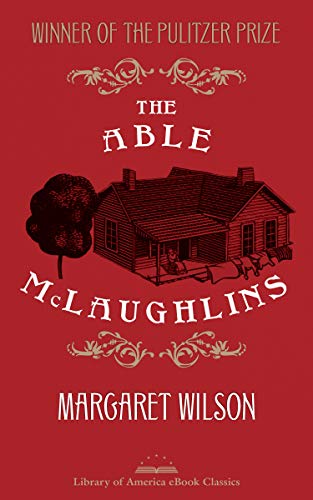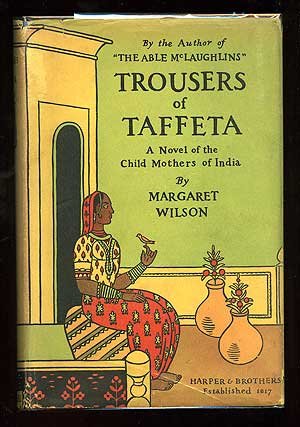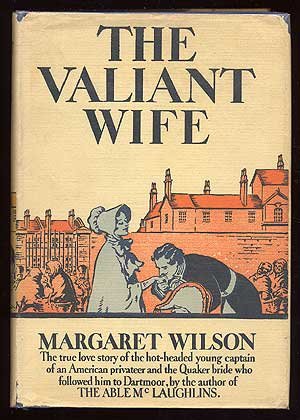Background
Margaret Wilhelmina Wilson was born on January 16, 1882, in Traer, Iowa. She was the daughter of West Wilson, a farmer, and Agnes (McComack) Wilson.

5801 S Ellis Ave, Chicago, IL 60637, USA
In 1904, Wilson received B.Phil. from the University of Chicago.
45 Francis Ave, Cambridge, MA 02138, USA
Wilson attended Divinity School from 1912 to 1914.




(Wully McLaughlin returns to his family’s Iowa homestead a...)
Wully McLaughlin returns to his family’s Iowa homestead at the end of the Civil War to find his sweetheart, Chirstie McNair, alone and in distress, her mother dead and her wayward father gone. Perplexed by a new aloofness in Chirstie, Wully soon discovers that she has been raped and is pregnant.
https://www.amazon.com/Able-McLaughlins-Library-America-Classic-ebook/dp/B07NCPHCTQ/?tag=2022091-20
1923

(TROUSERS OF TAFFETA: A Novel of the Child Mothers of Indi...)
TROUSERS OF TAFFETA: A Novel of the Child Mothers of India by Margaret Wilson. 1929 Stated First Edition. Pulitzer Prize winning author Hardcover
http://www.amazon.com/gp/product/B0006AKQZS/?tag=2022091-20

(Novelization of a true story about a Revolutionary War-er...)
Novelization of a true story about a Revolutionary War-era seaman and his Quaker bride, and their travels in the early days of the United States.....a story of adventure and endurance of a young American wife who crossed the Atlantic to try to rescue her husband. By the author of the Pulitzer Prize-winning "The Able McLaughlins".
http://www.amazon.com/gp/product/B00088GVK2/?tag=2022091-20
Margaret Wilhelmina Wilson was born on January 16, 1882, in Traer, Iowa. She was the daughter of West Wilson, a farmer, and Agnes (McComack) Wilson.
In 1904, Wilson received B.Phil. from the University of Chicago, he also attended Divinity School from 1912 to 1914.
In Wilson’s senior year, she decided to become a missionary to India for the United Presbyterian Church of North America. Wilson labored in India for five years, becoming more and more enmeshed in both the beauty and the difficulties of life in India. The experience was clearly formative for her, however, since she later wrote extensively of India and the intellectual problems that, for Wilson, arose there. Her first short stories, as Wilkie points out, were based on her experiences of India, and those stories were later transposed whole into Wilson’s two “India” novels.
In 1908, she began to publish those stories in better magazines. Spurred on by her success there, Wilson wrote her two first novels, The Able McLaughlins (1923) and The Kenworthys (1925). When the first of these was published, Wilson was an instant success. When Wilson returned to the States in 1912, she taught High School. At the same time, she began to write short stories, drawing on her experiences as a missionary.
In 1917, Margaret briefly resumed divinity school but left after completing only two more quarters. Much of her time after that was spent nursing her father, whose health had been failing for years, but the free time she had was devoted to writing. She completed a set of short stories collectively called "Tales of a Polygamous City," some of which appeared in the Atlantic Monthly in 1917 under the pseudonym "An Elderly Spinster." Two more of the "Polygamous City" stories were published in Asia magazine in 1921.
In 1923, Margaret published her first novel, The Able McLaughlins. A story of harsh life in the barely settled Midwest during the mid-19th century, examining especially the influence of religion in a sparse Scottish Presbyterian community, the book brought Wilson much critical and public attention. It would go on to be republished four times, most recently in 1977. Meanwhile, Wilson's father had died in 1923, and she had sailed to Europe, where she became reacquainted with George Douglas Turner. Wilson published her second novel, The Kenworthy's, in 1925. Considered a somewhat scattered book but nonetheless an important contribution to domestic novels of the period.
Margaret's marriage allowed Wilson to observe prisons firsthand, and she was greatly influenced by her husband's opinions on crime and penology. In 1931, she wrote a nonfiction work on these subjects, The Crime of Punishment, in which she discussed the conflict she saw between the moral correctness of punishment and the innate goodness of human beings. While her husband embarked on a crusade of prison reform, Wilson wrote three novels on these matters.
With Turner's retirement in 1938, the couple moved to Droitwich in Worcester, England, but the onset of World War II interrupted their country idyll. The British government recruited Turner for wartime assignments and filled their home with soldiers and refugees in need of temporary shelter with such frequency that the couple would spend weekends at a local hotel for some privacy and quiet. Aside from a children's book produced to earn money for home repairs in 1939, Wilson wrote nothing after the start of the war.
Margaret's husband suffered from illness throughout the fighting and died in 1946. In poor health herself, Wilson was cared for by her stepdaughters until she outlived them. She died in a nursing home in Droitwich in 1973, at age 91.
Margaret Wilson is best known for her intensely intellectual novels of religion, law, and feminism. When she won a $2,000 prize offered by Harper & Brothers in 1923, her name was unknown because she had signed her short stories in Harper's Magazine "An Elderly Spinster." Her work is of interest in part for its exploration of feminist issues in a domestic context set against a background of an unsympathetic judicial system.
Wilson's book was chosen to be the Harper Prize Novel of 1923, and soon thereafter won the Pulitzer Prize.
(Wully McLaughlin returns to his family’s Iowa homestead a...)
1923(Novelization of a true story about a Revolutionary War-er...)
(TROUSERS OF TAFFETA: A Novel of the Child Mothers of Indi...)
From her parents, West Wilson and Agnes McCornack Wilson, Wilson also gained a lifelong attachment to the Presbyterian church, which she would both serve and question with equal fervor.
Though Wilson has been criticized for allowing her intellectual interests to overshadow her literary interests, she is nonetheless credited with a clear eye for realistic detail. Moreover, Wilson wrote about her passions - feminism, India, and justice - in ways which prove enlightening if not always artful.
Wilson argued that laws create criminals and that prisons do not effectively stimulate rehabilitation. Although Turner was assaulted by inmates during riots at Dartmoor Prison the following year, Wilson remained resolute in her views on justice and the prison system.
At the University of Chicago, Wilson earned a reputation as a party girl.
Quotes from others about the person
“Although she belonged to a sorority and appears to have impressed her acquaintances as a girl who loved a good time, inwardly she was moving toward deep religious conviction, for which her parents’ faith had prepared her.” - Everett C. Wilkie, Jr.
On December 24, 1923, Wilson married George Douglas Turner, an English penologist.
